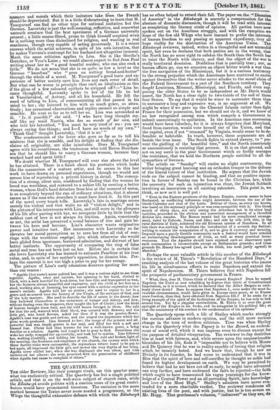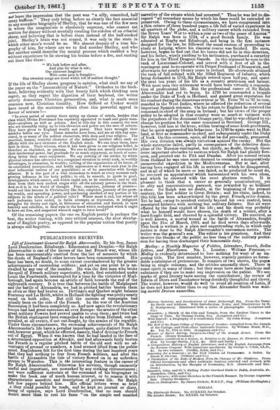Thank God !' thought Lavretzky, that it is so.' the
capital, even if not " resumed" by Virginia, would cease to be de. The condescension of the lover who goes so far as to tell his feasible or habitable. In truth, however, these arguments are all mistress that she is sensible, and his delight at finding that she dis- beside the true issue. The South fights to extend slavery, to " pro- claims all originality, are alike inimitable. Does M. Tourguenef vent the girdling of the beautiful tree," and the North consciously agree with his countryman, the tradesman who told Baron Haxthau- or unconsciously is resisting that process. It is on that ground, and sea that he should like to marry a German woman, because they not on any merit in the poor Government which so feebly manages
worked hard and spent little? the resistance, that we hold the Northern people entitled to all the We doubt whether M. Tourguenef will ever rise above the level sympathies of freemen. he has attained. There is a finish about his portraits which looks The article on " Sunday" will excite no slight controversy, the like the mannerism of a mature artist, and he seems in this last writer bringing great learning and an orthodox temper to the defence work to have drawn on personal experiences, though we would not of the liberal theory of that institution. He argues that the Jewish accuse him of reproducing a private history in detail. The concep- code on the subject cannot. be binding, and that no positive injunc- tion of a strong, silent man, maddened by finding that the woman he tion in favour of Sunday can be found in the Christian law, while loved was worthless, and restored to a nobler life by meeting a better the necessity for such an injunction was clear, the Jewish Sabbath woman, whom God's hand detaches from him at the moment of union, involving an innovation on all existing calendars. This point is, we is so completely beyond the run of ordinary situations, that it almost think, as new as it is well put :
seems as if the man who describes it mast have lived it. In this part " Even in the Eastern provinces of the Roman Empire, custom seems to have of the novel every touch tells. Lavretzky's fate in marriage seems fluctuated, as conflicting influences might determine, between the use of the merely the violent end that waits on all " violent delight," and in Greek Calendar and that of the Latin. Neither of these, as every one knows, the icture of his intercourse with Lisa, and still more in the glimpses
was based on the eeptenary principle or was even compatible with it. The Greek
month of thirty days, not only among the Athenians but in its other local of his life after parting with her, we recognize little by little that the varieties, proceeded on 'the obvious and convenient arrangement of a threefold noblest part of love is not always its fruition. Again, consciously division into decades. The Roman month had its more complicated arrange- or not, the artist has preserved a moral balance of loss and gain be- ment, ruled by Calends, Nones, and Ides; and side by side with this, in the tween his hero and heroine. Lisa's character wants originative rural districts of Italy, subsisted the old Etruscan system of Nundines. In all this there was nothing to facilitate the introduction of a seventh day festival: power and intuitive tact. Her intercourse with Lavretzky so far nothing to sustain the computation of it, and to give it currency and meaning. elevates her moral perceptions as to save her from all risk of mar- Imposed upon a purely Gentile community such a festival would have entailed riage with the worthless employe, into which otherwise she would an embarrassing disarrangement of ideas, as well as many practical incon- have glided from ignorance, borrowed admiration, and distrust of her veniences. That the Apostles should have enjoined such an observance upon better instincts. 7Elie opportunity of comparing the ring of false such communities is inconceivable except on Sabbatarian grounds; and these metal and true has not been lost on her. Before she is certain that grounds Dr. Hassey has agreed (and, as we think, has most justly agreed) to she loves Lavretzky she has learned to estimate Panchine at his true abandon."
Perhaps the most valuable article in this number of the Edinburgh is the review of M. Thiers's "Revolution of the Hundred Days," a The picture of Lisa's early education deserves quoting for more crushing analysis of the last volume of the great historian who passes his life in simultaneous efforts to resist Napoleon and extend the
spirit of Napoleonism. M. Thiers believes that with Napoleon fell
the prospects of parliamentary government in France. curious the curious advance in modern found its highest development on earth. We may be permitted to
sot leave the impression that the poet was " a silly, conceited, half crazy buffoon." They only bring before us clearly the fact essential to any complete biography of Shelley, that he was one of the few men in whom the imagination is absolutely supreme, who cannot eat mutton for dinner without mentally creating the eidolon of an etherial sheep, and believing that is before them instead of the half-cooked joint. Shelley's brain was not crazed, it was only in the state in which other men's would be so. We almost despair of a true bio- graphy of him, for where are we to find another Shelley, and who but another could describe the mental process which enabled a boy without experience to he stewing his brains before a fire, and ranting out lines like these :
" We look before and after, And pine for what is not; Our sincerest laughter
With some pain is fraught— Our sweetest songs are those which tell of saddest thought."
If the life of Shelley shows progress in opinion, what shall we say of the paper on the "Immutability of Nature." Orthodox to the back- bone, believing evidently with that hearty faith which thinking men regret, as they regret the digestion of their boyhood, the writer utterly denounces Christian persecution, and, what is much more common now, Christian timidity. How Gifford or Croker would have raved at the sentences which close this powerful appeal in favour of science !-
" In every period of society there spring up classes of minds, besides that class which Divine Providence has especially appointed to teach and guide man- kind—prophets as well as priests. And at this day in this country the men who are insensibly rising up to this elevation and power are the men of science. They have given to England wealth and power. They have wrought their miracles before our eyes. Those miracles have been, and are at this day asso- ciated, in so many of the noblest characters, with deep and true religion. The practical, honest, truthful character of the inductive intellect offers such an affinity with the best elements of the English mind. We can trust them, have faith in them. Their witness, when it has been given to our religious belief; is therefore so cherished, so precious. We owe to them not merely reverence for their intellectual power, but gratitude for so much enjoyment, so much of some- thing. better than mere enjoyment. We say nothing of the strides by which physical science has advanced to a recognized elevation in social rank, in worldly advantages, in education, in wealth; nothing of the organization of its forces, of its established incorporation, and bodily appearance as it were each year in the most influential centres of our population; or of its association with foreign alliances. It is the part of a wise statesman to watch at every moment each growing influence in the body politic; to aid, to smooth, to guide to good, developments which cannot, and which ought not, to be smothered, and to ally them from their very earliest stages with all the salutary powers in the State. And so it is in the world of thought. Fear, suspicion, jealousy of science— would not this become in Christianity like fear, suspicion, jealousy of the grow- ing wealth, and spreading power, and quickening intellect of any portion of his subjects in the minds of a political ruler? Where must it end, but where all such jealousies have ended, in futile attempts at repression, in indignant struggles for liberty and right, in bitterness of alienation and hatred, in open hostility and rebellion, in final ruin to the hand which enchained when it ought to have set free, and suspected where it ought to have loved?"
Of the remaining papers the one on English poetry is perhaps the best, the writer tracing, with rare critical acumen, the slow develop- ment of English poetry, as opposed to the popular notion that poetry is always self-begotten.































 Previous page
Previous page